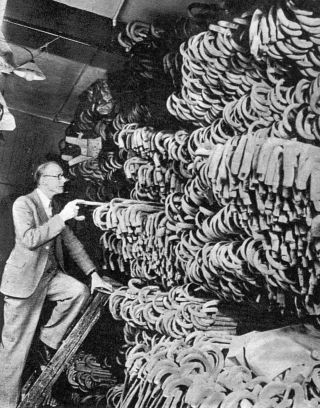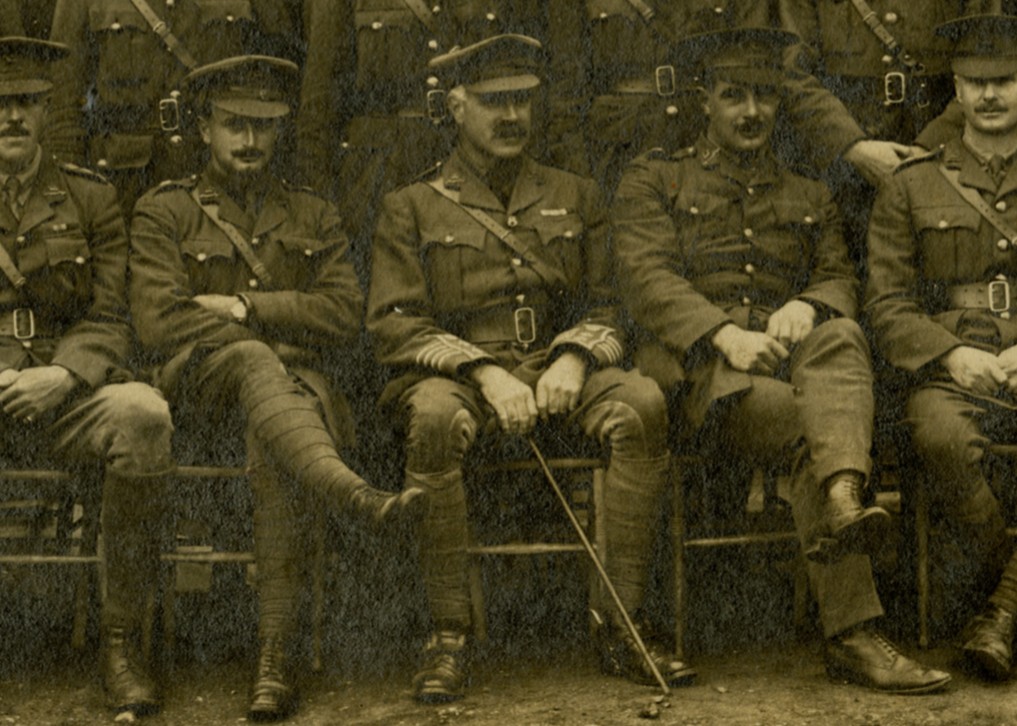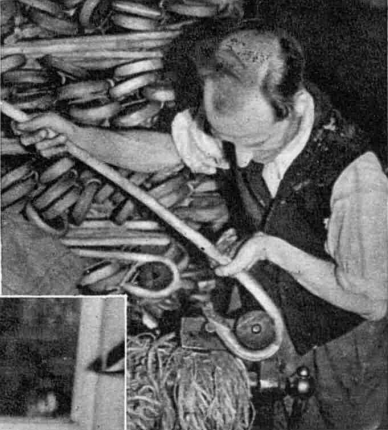Writing home on Tuesday, October 12, Jack Peirs had a lot to say. Two weeks had passed since the battalion’s catastrophic experience in the Battle of Loos, which had claimed over four hundred casualties including their beloved colonel. News about the larger battle was beginning to disperse, and Peirs recommended that his mother read an article published in the previous Saturday’s issue of the Surrey Advertiser for a full account of “our show.” The paper even included several firsthand accounts of the action in the form of extracts from letters written by local soldiers.
However, Peirs was quick to deny any references to himself that one particular letter contained, explaining that “These do not allude to me at all but to Fox & I have written to say so & if anyone mentions it to you please contradict them at once.” Adopting the faux-fierce persona he sometimes assumed when writing to his mother or sisters, Peirs insisted that “That idiot of a Private who wrote the letter doesn’t even know the name of his own Company Officer & ought to be slain.”
Despite having sent his corrections to the Advertiser, Peirs continued to worry and was still anxious about this case of mistaken identity nearly a week later. On October 17, he sent an uncharacteristically emphatic letter to his father, confessing “I am still worried about that letter of that idiot Lintott’s & the worst is that I have got to live up to it!!” Exclamation points are rare occurrences in Peirs’s correspondence – the text of the entire collection contains approximately six – so the double usage here communicates a real urgency. “I have written to the S. A. to tell them that it has nothing to do with me,” fretted the younger Peirs, “& I don’t see what more I can do.”
What were these allusions that so troubled him? And who was the Private Lintott who caused so much strife? A little investigation into contemporary issues of the Surrey Advertiser brings us some answers. The paper’s October 9, 1915, edition was largely devoted to coverage of the Battle of Loos, specifically the actions of the East and West Surrey battalions. There was “A Heavy List” of casualties and an early selection of tributes, including a lengthy obituary for Colonel Fairtlough.
The paper also published excerpts from two letters that Private Victor E. Lintott, a soldier of the 8th Queen’s, had written to his wife in Hambledon, Surrey. Mrs. Lintott was in fact responsible for sharing the letters – though it is not stated whether her husband encouraged or even knew of their publication. The Lintott family was well-known in the area as owners and operators of a walking-stick factory, which had been founded by Victor Lintott’s grandfather in 1858. During the war, the family was prolific for its number of relatives in service: there are six Lintotts listed on a partial register of divisional recruits from 1914-1917, and the Advertiser noted that as of October 1915, along with two brothers (one of whom was also with the 8th Battalion) and a brother-in-law, Private Lintott had 22 cousins “with the colours.”

A photograph of the Lintott walking-stick factory in 1941. “A Family Affair: From Shed to Factory at Downland Farm.” Illustrated Sporting and Dramatic News, 17 January 1941.
Victor Lintott’s account of Loos is breathless and disjointed; like Peirs he seems to be processing his emotions as he writes. Having been hit by a large piece of shrapnel, he declares to his wife, “I am jolly thankful I am spared to write to you. It was awful to see the men drop, though I didn’t think about it till afterwards.” He mentions six men who have been killed or wounded by name, seemingly individuals his wife would have known personally.
Lintott expresses some optimism in the case of a missing soldier, writing that “Corpl. Gittens was wounded, and is missing, but he is in hospital, I expect.” In an interesting contrast, Peirs assumes the worst when it comes to missing comrades. In his first letter post-Loos, he reports “[Fairtlough] & Charlie Cressy both killed & probably 3 more…. Please don’t say a word about Charlie… I do not know absolutely for certain that he is killed as no one has seen his body, but I am afraid he is.” While the fate of Corporal Gittens remains unknown to us, Peirs was unfortunately correct in his conclusions about Cressy. Perhaps these different assumptions about their colleagues’ fates reveal a difference in personalities between Lintott and Peirs, but it is also possible that as an officer Peirs simply had access to more information than Lintott did. Alternatively, Lintott may have been trying to frame the outlook more positively for his wife – something Peirs would do while writing to his mother a few days later.
However, the part of Lintott’s letter, actually published twice in successive issues of the Surrey Advertiser, that distressed Peirs was its reference to “Major Piers,” whose bravery was lauded as “magnificent.” The Advertiser latched on to Lintott’s powerful description of the officer who “led us with a cigarette in his mouth, his walking stick in one hand, and his revolver in the other.”
The trouble was, as Peirs stated, that he hadn’t led B Company with a walking stick in one hand and revolver in the other – Major George Fox had. Like Peirs, Fox had served in the military prior to the war. He was previously a 2nd Lieutenant in the Queen’s territorial force, resigned his commission in 1906, and reenlisted in 1914. Shortly after Loos, Fox was appointed Staff Captain of the 72nd Brigade, possibly as a result of his “magnificent” leadership under fire. Peirs held Fox in high regard and expressed some disappointment at his transfer, but also recognized it would be helpful to have a friend on brigade staff. Later on in the war, Fox was helpful in another way by loaning his gramophone to the officers of the 8th.
The mix-up between the two men in the article of October 9 caused Peirs considerable worry. In his anxiety over having been given undeserved credit, Peirs half-jokingly derided Lintott as an “idiot of a Private.” But considering the chaos of the Queen’s trial-by-fire, in which Lintott had seen friends fall around him and experienced a narrow scrape himself, his potential confusion becomes more understandable. Additionally, if the pre-embarkation photograph of the 8th Queen’s officers is any evidence, there were some physical similarities between Majors Peirs and Fox. Admittedly the group is a sea of mostly-mustached faces, but the resemblance between the two is perhaps a bit stronger than some other pairs of officers. Both men sit with their legs jauntily crossed, Peirs with his arms folded, Fox without his puttees.

Peirs (L) and Fox are shown here on either side of Colonel F.H. Fairtlough, prior to the Battalion’s embarkation for France in August, 1915.
In the end, Peirs’s efforts to correct the case of mistaken identity were successful, as on October 16 the Advertiser printed “Major Peers’s Disclaimer.” The editors graciously took the fall for the error – though without access to the original letter it’s difficult to pinpoint the broken link in the chain of communication from the trenches of Loos to the pages of the Surrey newspaper. Peirs was thus relieved of his stress over what he called “flummery,” and fortunately for both men he does not appear to have made good on his (probably facetious) threat of October 13 – “If I get hold of Private Lintott I’ll wring his miserable neck.”
After the paper containing the correction reached the front, Lintott was never again mentioned in the Peirs letters, at least not by name. He survived the war and returned home to Surrey, where he resumed work at his family’s walking-stick factory. By 1941 he had been promoted to junior director and continued to craft sticks, umbrella handles, and shepherd’s crooks alongside his brothers, cousins, and uncles. The Lintott factory was depicted in at least two newsreels, 1934’s charming Just Sticks! and 1949’s Walking Sticks, which featured Victor Lintott’s brother John, possibly also a veteran of the 8th Queen’s. Victor himself was pictured at work in a 1941 article about the factory published in Illustrated Sporting and Dramatic News. The walking-stick business closed in the 1960s and we lose track of Lintott thereafter, but however unwittingly, his story as a private in 1915 provides us some welcome comic relief amidst our remembrance of the Battle of Loos.

